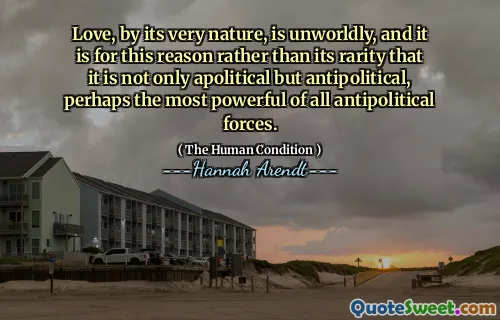"The Human Condition" by Hannah Arendt explores the nature of human activities and the conditions that define the human experience. Arendt examines three fundamental activities: labor, work, and action, each contributing uniquely to the human condition. Labor involves the physical necessities of life, while work pertains to the creation of a durable, meaningful world through objects and artifacts. Action, on the other hand, signifies the interaction between individuals and the capacity to initiate change, emphasizing human plurality and the importance of freedom in political life.
The book delves into the implications of these activities for understanding human existence and society. Arendt argues that contemporary life often blurs the lines between labor, work, and action, leading to a loss of meaningful engagement with the world. She critiques modernity's focus on efficiency and productivity, which can alienate individuals from their true selves and diminish the value of political participation. Through her analysis, Arendt encourages readers to reflect on the significance of authentic action in a communal and political context.
More »
Today Birthdays
1729 -
Edmund Burke
1949 -
Haruki Murakami
1954 -
Howard Stern
1876 -
Jack London
1993 -
Zayn Malik
1951 -
Kirstie Alley
1863 -
Swami Vivekananda
1923 -
Alice Miller
1987 -
Naya Rivera
1825 -
Brooke Foss Westcott
1944 -
Joe Frazier
1951 -
Rush Limbaugh
1964 -
Jeff Bezos
1978 -
Jeremy Camp
1628 -
Charles Perrault
1856 -
John Singer Sargent
1970 -
Kaja Foglio
1953 -
Rick Santelli
1986 -
Gemma Arterton
1968 -
Raf Simons
1958 -
Christiane Amanpour
1966 -
Olivier Martinez
1996 -
Ella Henderson
1917 -
Maharishi Mahesh Yogi
1949 -
Ottmar Hitzfeld
1928 -
Ruth Brown
1968 -
Heather Mills
1946 -
George Duke
1968 -
Rachael Harris
1923 -
Ira Hayes
